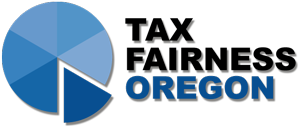In its final “Legislative Days” before the new House and Senate are sworn in, TFO was invited to describe Oregon’s tax structure in a hearing of the House Committee on Economic Development and Small Business. Appearing with the tax lobbyist from Oregon Business and Industry, Jody Wiser countered pleas that the legislature turn the tax code upside down on behalf of semiconductors and businesses broadly.
First up was Oregon Business Council President Duncan Wyse, who sketched the August report of the Oregon Semiconductor Competitive Task Force. The task force, which got off the ground last winter, has a roster of business and higher-ed personages and elected leaders (no public-interest groups) and is staffed by the Oregon Business Council. Wyse emphasized acting fast to grab a share of federal money from the CHIPS Act, by which Congress intended to generate domestic production.
In questions following Wyse’s pitch, three legislators asked about education and workforce development. None spoke to business subsidies.
OBI’s Scott Bruun introduced a study the lobby had commissioned from the accounting firm Ernst & Young purporting to show the tax burden Oregon had imposed on business in recent years. The share borne by business, E&Y contended, had grown by a quarter as a share of state domestic project from fiscal 2019 to 2021. E&Y also mixed in income taxes imposed in Portland, Multnomah and Metro to claim that business taxes in Portland had grown by a third.
The study is glib in aggregating the various tax increases across different jurisdictions and defining the share borne by “business.”
Jody, sitting beside Bruun, began by addressing the ways in which the federal and state governments have slashed business taxes over the last four decades. The federal tax code has allowed business to avoid paying corporate income taxes by reorganizing as pass-throughs, LLCs, partnerships, REITs, etc., whose owners don’t pay tax at the entity level, only as individuals.
At the state level, Oregon has gifted business with exceptions unavailable to individuals:
- Over phases completed in 2005, Oregon slashed taxes for manufacturers that sell production outside of Oregon by adopting the “single sales factor,” dropping payroll and property from the apportionment formula. The 2019 CAT tax also is based only on Oregon sales, so global companies like Nike and Intel pay little.
- In 2013 and again in 2021, the legislature reduced tax rates for pass-through entities.
- Under Enterprise Zones and the Strategic Investment Program, businesses are exempt from property taxes for 3, 5 or 15 years. All kinds of businesses get these exemptions.
- Under Urban Renewal Zones and the Industrial Site Readiness Program, the cost of new infrastructure for businesses is shifted from businesses to residents or the General Fund.
What hasn’t changed: Oregon has no sales tax, a significant factor in business-to-business transactions.
Jody then turned to the consequences of the myriad provisions that the committee has unveiled in draft bills for 2023. “If the legislature were to increase tax subsidies for business, the money would come from one of two places: reduced services, or increased tax burden for employees.”
The draft bills, which are pitched as part of the package subsidizing the semiconductor industry, would be available to business broadly, with no targeting to semiconductor businesses.
“To the extent the legislature increases subsidies for semiconductor expansion or anything else, we urge it to adopt a budget and use the appropriations process, not the tax code. The Governor’s Strategic Reserve Fund is a nimbler instrument for directing expenditures to gather federal CHIPS funded businesses to Oregon . . .
“The tax credits and reimbursements in your committee bills are likely to result in runaway expenditures, as happened with the Business Energy Tax Credits.” BETC, as a diminishing number of legislators remember, became a scandal after the legislature expanded it in 2006 and 2008, before terminating the program 2014.
Finally, she addressed the E&Y report. “We find it a narrow, cherry-picked collection of factoids. Its main contention, that Oregon has moved from a low-tax state to average, is because the legislature and the voters have increased funding for K-12 education [the CAT] and mandated benefit standards like paid family leave and health insurance. Like all other taxes, the new levies of recent years pay for something: public goods. The OBI report says nothing about that.”
TFO’s full statement is available here. A recording of the hearing is here.
We are analyzing the bills that industry wants in the next session. None has a cost estimate.
We’re also developing support for our offensive agenda. More on that in the weeks to come.


